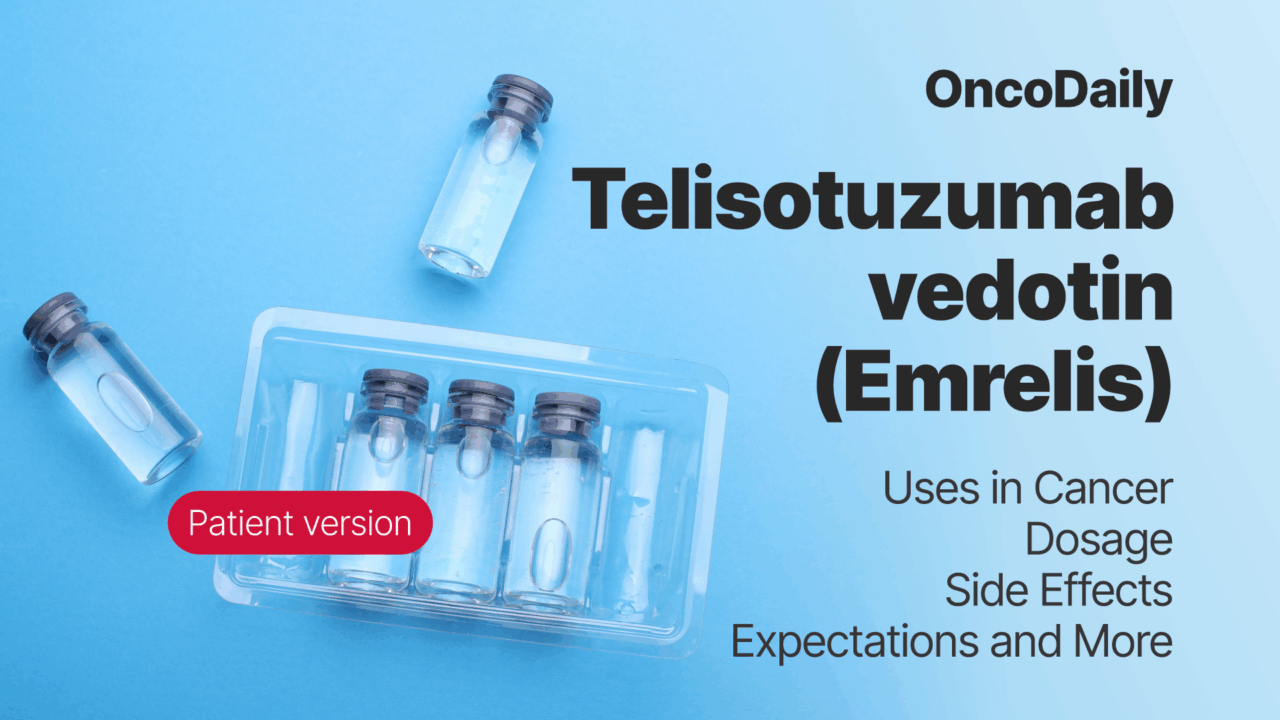Emrelis is a new type of cancer medicine that’s giving fresh hope to adults with certain advanced lung cancers. It received accelerated approval from the U.S. FDA in May 2025 for treating people with non-squamous non-small cell lung cancer (NSCLC) whose tumors have high levels of a protein called c-Met and who have already tried other therapies.
Developed by AbbVie, in collaboration with Seagen, Emrelis is part of a growing class of cancer treatments called antibody-drug conjugates—designed to find and destroy cancer cells more precisely while limiting damage to healthy tissues.
What Is Telisotuzumab vedotin and How Does It Work?
Telisotuzumab vedotin, marked as brand name Emrelis, belongs to a class of treatments known as antibody-drug conjugates (ADCs). This means the drug combines two parts: an antibody and a chemotherapy agent. The antibody is designed to find and attach to c-Met, a protein found in large amounts on the surface of some lung cancer cells. In normal cells, c-Met plays a role in growth and healing, but when too much of it is present in cancer cells, it can cause tumors to grow and spread more quickly.
Once Emrelis attaches to a cancer cell with c-Met, the cell absorbs the drug. Inside, the chemotherapy component, called monomethyl auristatin E (MMAE), is released. This agent interferes with the cell’s ability to divide and survive, causing the cancer cell to die. By delivering chemotherapy in a more targeted way, Emrelis aims to kill cancer cells while limiting damage to healthy ones, offering a more precise and less toxic treatment option.
What Cancers Does Telisotuzumab vedotin Treat?
Currently, Emrelis is approved for use in adults with non-squamous non-small cell lung cancer that is locally advanced or metastatic and shows high expression of the c-Met protein. High c-Met expression means that at least 50% of tumor cells have strong staining for this protein. This treatment is only given to patients who have already received at least one type of systemic therapy for their cancer. Ongoing research is investigating Emrelis in other groups of patients and in combination with additional therapies.
Efficacy and Results from Clinical Trials
The approval of Telisotuzumab vedotin was based on results from a Phase 2 clinical trial known as LUMINOSITY. This study evaluated the drug in patients with advanced non-squamous NSCLC that had already been treated with other therapies. A total of 172 patients were enrolled, and 161 were included in the primary analysis. The study focused on two groups: patients with high c-Met expression and those with intermediate levels.
In the high c-Met group, the drug achieved a response rate of 34.6 percent, meaning over one-third of patients saw their tumors shrink. The median duration of response in this group was 9 months. For patients with intermediate c-Met expression, the response rate was 22.9 percent, and the median duration of response was 7.2 months. Across all participants, the overall response rate was 28.6 percent, and most patients who responded maintained that benefit for at least 6 months.
Updated results from the LUMINOSITY trial were later published in the Journal of Thoracic Oncology. In this analysis, 168 patients were treated with Emrelis at 1.9 mg/kg every two weeks. Among patients with high c-Met expression, the response rate was 34.5 percent. In the intermediate group, the response rate was 23.8 percent. Across all patients, the median duration of response was 7.2 months, progression-free survival was 5.6 months, and overall survival was 14.2 months. These findings confirm that Emrelis provides a durable benefit for patients with advanced NSCLC, especially those with high c-Met expression.
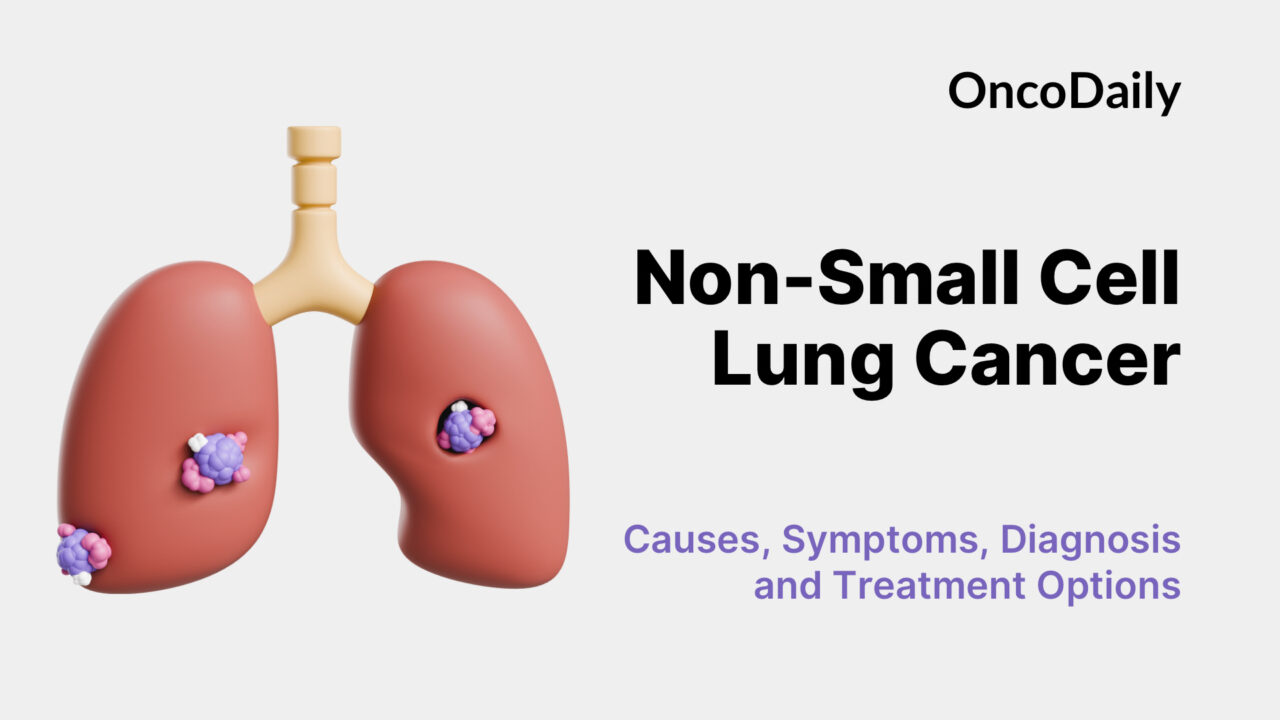
Learn more about Non-Small Cell Lung Cancer: Causes, Symptoms, Diagnosis, Treatment Options, and Latest 2025 Advances in Targeted and Immunotherapy on OncoDaily.
What Is a Clinical Trial and Why Does It Matter?
A clinical trial is a research study designed to test new drugs and treatments in patients to determine their safety and effectiveness. Before Emrelis was approved, it went through multiple phases of clinical trials to assess how well it worked, what side effects it caused, and whether it was better than existing treatments. Clinical trials are essential because they provide scientific evidence that a drug can help patients while ensuring it is safe for widespread use.
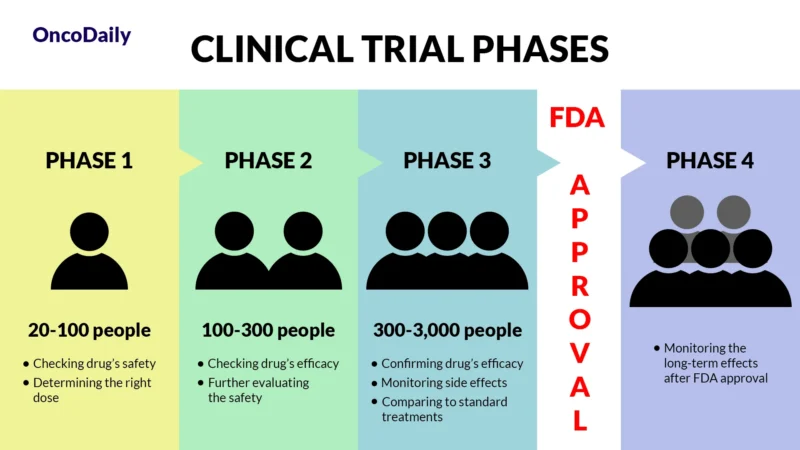
What Does FDA Approval Mean?
When a drug receives FDA approval, it means that after rigorous testing in clinical trials, it has been shown to be both safe and effective for treating a specific condition. This approval makes the drug widely available for doctors to prescribe and helps patients access new, cutting-edge treatments sooner.
What Is the Recommended Dose of Emrelis?
The recommended dose of Telisotuzumab vedotin is based on body weight. Patients typically receive 1.9 milligrams of the drug per kilogram of body weight. For individuals who weigh 100 kilograms or more, the dose is capped at 190 milligrams. The treatment is given every two weeks. Patients continue therapy as long as the cancer does not worsen and the side effects remain manageable.
How Is Emrelis Administered?
Emrelis is given through an intravenous (IV) infusion, usually in a hospital or clinic setting. The drug comes as a dry powder in vials that must be carefully mixed with sterile water by trained healthcare professionals. After preparation, the solution is added to a saline bag and infused into the patient’s vein. The infusion is done over a short period and repeated every 14 days.
For patients who previously experienced infusion reactions, doctors may give premedication—such as antihistamines, steroids, or fever reducers—about 30 to 60 minutes before treatment to help prevent side effects. Emrelis should be infused on its own and not mixed with other medications. Careful preparation and disposal of the drug are necessary because of its potent chemotherapy component.
What Is the Half-Life of Telisotuzumab vedotin?
The half-life of Emrelis refers to how long it stays in the body before being cleared. On average, the half-life of telisotuzumab vedotin is about 4 to 5 days. This means that after one dose, it takes approximately that amount of time for half the drug to be eliminated from the body. Because of this, Emrelis is typically given once every two weeks to maintain steady levels in the blood while allowing the body time to process and recover from the drug’s effects.
Telisotuzumab vedotin Side Effects and Management
Like many cancer treatments, Emrelis can cause side effects. The most common side effect is peripheral neuropathy, which causes numbness, tingling, or burning sensations in the hands and feet. This occurred in about 30 percent of patients. Swelling in the legs or arms, fatigue, nausea, decreased appetite, and constipation were also reported. Laboratory tests sometimes showed changes in liver or kidney function and imbalances in blood levels of minerals like calcium, sodium, potassium, and magnesium. Some patients experienced blurred vision or eye inflammation, a condition called keratitis.
Less common Side effects
Though rare, serious side effects can occur. Some patients developed severe peripheral neuropathy that interfered with daily activities and required treatment to be stopped or adjusted. Two patients experienced life-threatening lung problems such as interstitial lung disease and respiratory failure.
Side effects management
Managing side effects is crucial to staying on treatment. Patients should report early signs of nerve problems, such as tingling or numbness, to their doctor immediately. Medications like gabapentin or duloxetine may be used to relieve nerve pain. Fatigue can often be managed through a balance of rest and light physical activity. Anti-nausea medications and laxatives are usually effective in controlling digestive issues. Leg swelling can be relieved by elevating the legs or using compression socks. Regular blood tests help catch liver, kidney, and electrolyte changes early so adjustments can be made. Any eye issues should be promptly evaluated by an eye specialist.
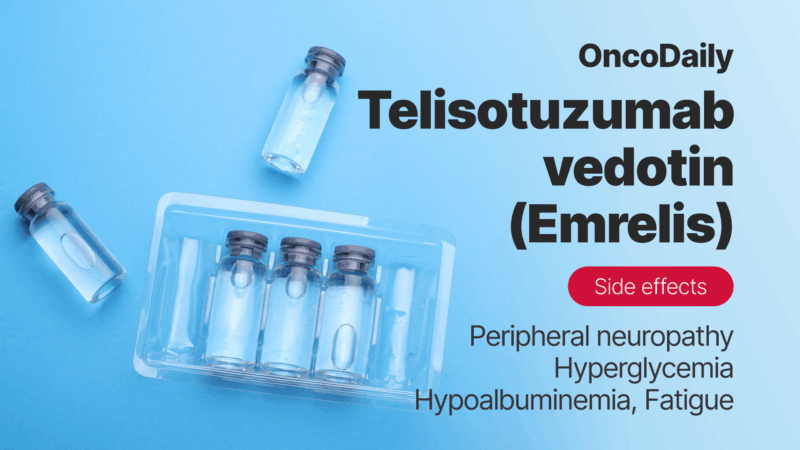
What to Expect Long-Term?
Emrelis is not a cure, but it may help manage cancer, shrink tumors, and prolong life, especially in patients whose cancer is difficult to treat. In the LUMINOSITY trial, many patients maintained their response for six months or longer, and overall survival reached a median of 14.2 months. These results suggest that Emrelis can provide meaningful benefit over time. However, patients should continue regular monitoring, as the cancer may eventually progress, at which point treatment plans may need to change.
What Should You Avoid During Treatment?
To stay safe during treatment, patients should avoid pregnancy and breastfeeding, as the drug may harm a developing baby. Contact with people who have infections should be minimized because the immune system may be weaker during treatment. Live vaccines should be avoided, and alcohol or other substances that affect the liver should only be used with a doctor’s guidance. It’s also essential to keep up with lab tests and report any unusual symptoms right away, especially those related to nerve pain or breathing difficulties.
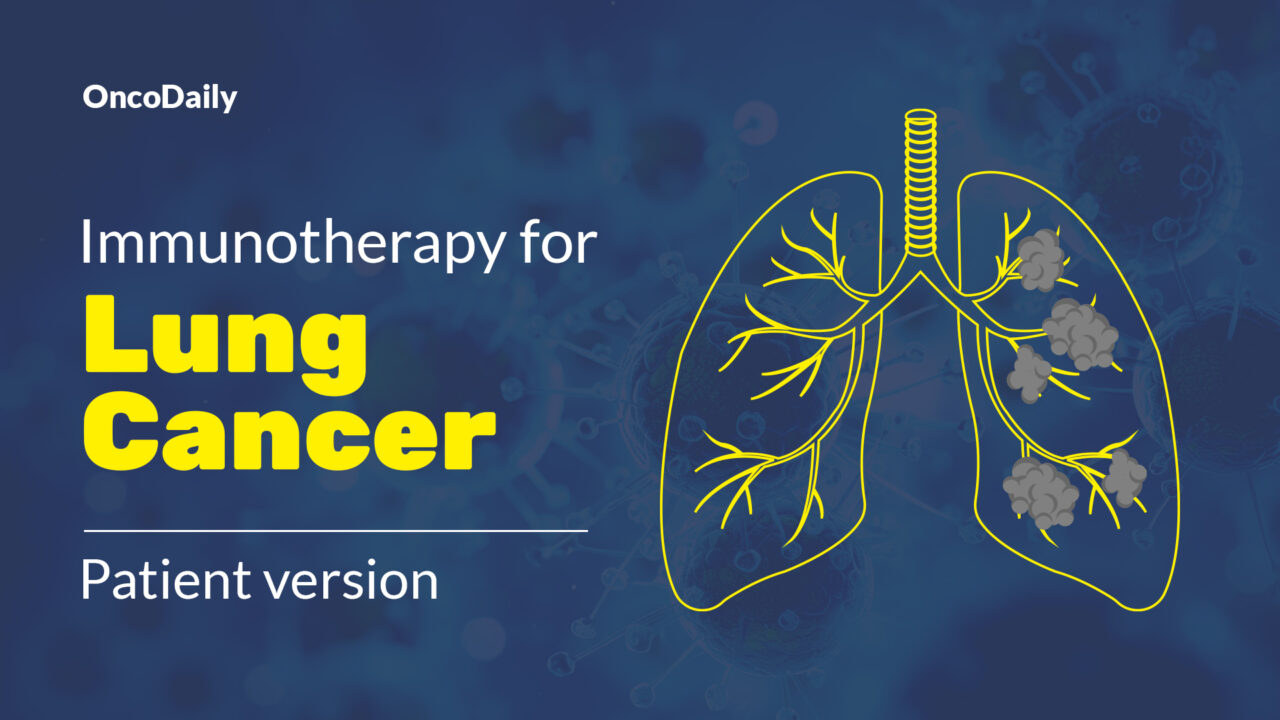
Learn more about Immunotherapy for Lung Cancer on OncoDaily.
Real-Life Effectiveness
Beyond clinical trials, Emrelis is showing real-world promise. Its targeted nature allows doctors to offer it to patients with a clear biological marker—c-Met overexpression—which helps match the right drug to the right patient. Early feedback from clinical use aligns with trial findings, reinforcing the belief that Emrelis provides durable responses and manageable side effects.
Looking Ahead – The Future of Treatment
Researchers are continuing to explore the full potential of Emrelis. Ongoing trials are testing it in combination with other drugs and in broader patient populations. If future studies confirm its benefits, Emrelis may become a standard treatment option for more types of lung cancer. Its success also highlights the importance of biomarker testing and precision medicine in improving cancer outcomes.
What Other Trials Are Ongoing?
Telisotuzumab vedotin is currently being studied in additional clinical trials, including a large Phase 3 study (NCT06093503) led by AbbVie. This trial is evaluating whether combining Emrelis with osimertinib, a common EGFR-targeted therapy, can improve outcomes compared to standard chemotherapy. The trial includes patients whose advanced non-squamous NSCLC has both an EGFR mutation and high c-Met expression and whose disease has progressed after previous EGFR inhibitor treatment. Approximately 250 patients will be enrolled and randomly assigned to receive either Emrelis with osimertinib or chemotherapy with cisplatin or carboplatin plus pemetrexed. The trial is expected to provide important insights into whether this combination can become a new standard of care.
If you’re a healthcare provider, access the professional version here.


